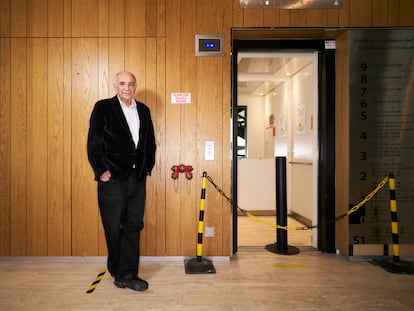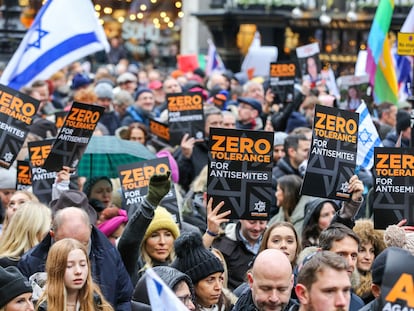Michel Wieviorka, sociologist: ‘Jews are the scapegoat par excellence’
For the French thinker, some of whose family died in the Holocaust, anti-Semitism is real. He says that the behavior of the Israeli Government in the war is generating hatred towards Jews

Members of this French sociologist’s family died in the Holocaust. Anti-Semitism is not something abstract for him, it is history and family memory. But Michel Wieviorka was lucky enough to grow up in another era, in a secular and progressive, cultured and republican environment in the post-war period. And throughout his life he has “almost never” been personally confronted with hatred of the Jews. When asked what place his Judaism occupies in his identity, he says: “It’s not what generally comes to mind first, but I don’t hide it. I don’t minimize it.”
We spoke in an office at the School for Advanced Studies in the Social Sciences (EHESS), his academic home. It is a place steeped in history. There is intellectual history: Fernand Braudel and his teacher Alain Touraine, among others, taught here. And national history: the building was on the location of the Cherche-Midi prison, which was used by the Germans during the occupation. From the window you can see the Hotel Lutetia, where the Jews who survived the Nazi camps returned.
The veteran intellectual has just published Antisemitism explained to young people (Spanish translation by Agustina Blanco) and The last Jewish joke. Golden age and decline of Jewish humor (in French).
Question. Has a new anti-Semitism been unleashed since Hamas’ attack on Israel on October 7? An increase in anti-Semitic acts has been recorded in France and other countries.
Answer. I would not say that it is a new anti-Semitism, but that an anti-Semitism that already existed has been amplified.
Q. What happened?
A. It has given sectors of the left the opportunity to allow what I would call a soft, muffled denial to appear. It is not the denial that says that the gas chambers did not exist. It is a denial to the extent that there are those who say: ‘I’m keeping quiet about what happened on October 7. It is not important. It does not deserve to be commented on, and Hamas are the resistance. They are freedom fighters.’ It is not an explicit anti-Semitism that says: ‘I want the death of the Jews, or to destroy them.’ It is anti-Semitism to the extent that a very violent, criminal, terrorist act is covered in silence.
Q. Is it surprising that anti-Semitism, which was associated with the extreme right, is now found on the left?
A. In France, the classical left is very weak. On the other hand, the much more radicalized hard left is strong, and this left tries to woo the immigrant electorate, who are often of Arab origin or of the Muslim faith, but not necessarily. In this universe, the Israeli-Palestinian conflict is seen differently than in other universes.
Q. And the extreme right denies anti-Semitism.
A. It is the paradox. The institutional extreme right presents itself as hostile to anti-Semitism. Marine Le Pen has made clear decisions in this regard by saying that she rejects it, but from the political space in which anti-Semitism existed.
Q. That’s good news, right?
A. It’s good news, which doesn’t mean it’s totally true. Furthermore, this party allies itself with other far-right parties in Europe in which anti-Semitism is more active or visible. It’s a fragile positioning, and we may wonder what lies beneath. And secondly, this does not prevent there from being an extreme right with skinheads, neo-Nazis, or anti-Semitic intellectuals. This is the political landscape.
Q. And what about beyond politics?
A. There is the infrapolitical landscape of violence and hatred. Violence is anonymous and we must incriminate — in part and with great caution — the world coming from Arab-Muslim immigration. In this universe there is anti-Semitism, in the form of prejudices and anti-Semitic acts. On the other side of the board, but an infrapolitical board, there are those who desecrate graves in Jewish cemeteries. This is the landscape. To which we must add one last thing: they are people with the idea that Jews want to control the media and control opinion, and limit freedom of expression.
Q. There is a slogan in pro-Palestinian demonstrations since October 7 and since Israel’s attack on Gaza began: “From the river to the sea.” The idea is that there should be a Palestinian state from the Jordan River to the Mediterranean and, therefore, Israel should disappear. What do you think?
A. When it is said that a state recognized by the UN must disappear, it is saying something different than criticizing a political regime. I hate Netanyahu. If I just say that I hate Netanyahu and that I hope Israel changes its government and policies and takes the path of peace, very good. I think so. But if I say that the problem is not Netanyahu, but the existence of the State of Israel, with or without Netanyahu, then I get into anti-Semitism. The idea that there cannot be a state because it is Jewish. If I tell you “from the river to the sea there should not be a single Jew in this part of the world, this state must disappear”, this is anti-Semitism.
Q. How do you define yourself? Are you a Zionist or a non-Zionist?
A. I like the word I once heard [former environmentalist deputy and May 1968 youth leader] Daniel Cohn-Bendit say: a-Zionist. I am not interested in debating whether I am for or against the existence of the State of Israel. It exists. Asking for its destruction is out of the question. That’s it. This does not mean that I will defend Netanyahu’s policies. Having said that, I will explain something to you. I feel a bit like Camus during the Algerian war. One day he wrote a letter to his friend Jean Sénac. He told him: “I’ll shut up. I can’t talk anymore.” He felt torn. Well, in this conflict I feel torn. I cannot support Israel 100% and I cannot defend Hamas. What can I do? Around me I see mostly people who are in one camp or another. I don’t want to be in a camp, I want to be with those who want peace. It is not easy. So I don’t say much.
Q. Was October 7 a pogrom?
A. It had the dimensions and the logic of a pogrom. But not only that. It also had a military logic. The pogroms did not have a military purpose. They consisted of throwing spears at the population to kill Jews in a town. In general, there was a more or less explicit agreement in central Europe between the power and the population. But it was not for military purposes. There is a mix here.
Q. How have you experienced what happened since that day?
A. I am part of those who find the way in which Israel carries out its war today shocking. Shocking. I can't defend this war. Even less because it causes tens of thousands of victims on the Palestinian side and because, furthermore, it is Israel's denial of a principle to which its citizens feel attached: "Everything for the hostages."
Q. Anti-Semitism began at least two millennia ago. Will it ever end?
A. It transforms. Anti-Semitism, in fact, is a word that dates back to the late 19th century. Before there was anti-Judaism. It is true that the Jewish people are the only ones to have known 2,000 years of persecution, hatred, destruction, but also resilience, resistance, and the ability to create humor. Will anti-Semitism endure in a renewed form? Unfortunately, I think so, and what we are experiencing at this time rather feeds it.
Q. What do you mean?
A. The behavior of the Israeli Army and the Israeli Government generates hatred towards Israel and hatred towards the Jews, who many people think that [Jews around the world] are the allies of this government. But anti-Semitism is not born from this government action. Anti-Semitism has found something to feed on. You can detest a government without having to detest the affected population, especially when it does not depend on it, as is the case of the Jews in the diaspora.
Q. Anti-Semites do not need Israel to do what it does to be anti-Semitic.
A. No, of course not. The spread of anti-Semitism is fueled by context, but it is irrational, it works by creating scapegoats. There is no society that, at one time or another, does not seek an explanation for its misfortunes or its difficulties or its crises, and the Jews are formidable because it can always be said that they conspire, or that they act in the shadows. They are the scapegoat par excellence and there is no reason, unfortunately, for that to disappear.
Sign up for our weekly newsletter to get more English-language news coverage from EL PAÍS USA Edition










































